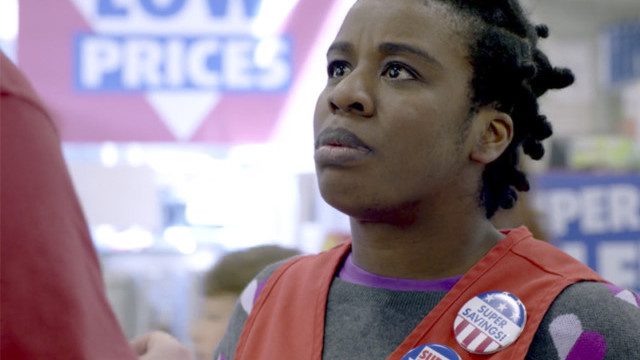Goddamn, what an episode. “People Persons” is not only the best installment of Orange Is the New Black‘s terrific fourth season, it might be the best episode the show has ever done, period. It was the perfect culmination of the show’s slow-burn storytelling, and even though a hell of a lot happened, the episode, which is Orange at its blackest and bleakest, laid the framework for huge future developments. It’s nothing short of jaw-dropping.
Speaking of dropping (ugh, sorry) – how about that Suzanne flashback? One of the greatest achievements of Orange Is the New Black over these last two seasons has been the successful humanization of Suzanne Warren, a woman who cannot rightfully (and dismissively) be called “Crazy Eyes” anymore. I think a big reason for the success of Suzanne’s post-Vee storylines is pretty simple, and it’s the same reason that Lolly Whitehill has become such a good character: mental illness is not a joke.
“People Persons” wrings the maximum amount of tragedy out of Suzanne’s past, and I’m amazed that OITNB has been able to go four seasons without showing the past of one of its most iconic characters (save for an uncomfortable sleepover flashback a few seasons ago). Director Lev L. Spiro (UnREAL, Weeds) wisely shoots Suzanne in a majorly sympathetic light, but neither he nor Uzo Aduba shies away from Suzanne’s fickle pysche. It’s easy to see why Aduba has two Emmys for playing Suzanne, as she transitions nicely from being overjoyed at earning Employee of the Month to fending off a full-fledged panic attack when her sister wants to leave her alone for the weekend. Once she runs into Dylan, a boy she recognizes from her job, the sequence takes on an air of sickening inevitability, and as Dylan plummets in terror out of Suzanne’s window, his disappearance, so total and final, is just as heartbreaking for us as it is for her.
“People Persons” could easily have coasted on the strength of Suzanne’s flashback, but the episode has much loftier, and darker, goals. The investigation into Ian’s death is nothing less than stomach-churning. The prison goes into lockdown, the lights stay on, and inmates are called seemingly at random, to wait under Kafkaesque fluorescent lights until Piscatella decides he wants to talk to them (one of the episode’s few moments of levity is when Freida is visibly offended that she wasn’t considered a suspect in Ian’s death).
Piscatella only has one person on his mind, though: Red. Their scenes together are…well, normally I’d use a word like “delight,” because I’m an enormous douche, but while Kate Mulgrew and Brad William Henke are fantastic opposite each other, their scenes achieve tension more than they do real enjoyment. It’s some of the finest acting in the episode, and it’s admittedly cool to see Red in crime-boss mode (“Most crimes remain unsolved unless someone talks,” she tells Alex). And she gets the most important line of the episode, as she offhandedly refers to the new COs as Piscatella’s “private militia,” which, yes, is absolutely true.
These psychopaths are running roughshod over Litchfield with the air of zero-accountability that you see in private military contractors. Stratman, Humphrey, and Dixon are by far the worst – Stratman refers to using the restroom as a “special privilege,” Dixon smashes Taystee’s watch after addressing her using an epithet, and Humphrey might be this show’s biggest villain. There’s no sicker scene in this episode – or maybe in the series – than when Humphrey encourages Brandy to fight Suzanne, saying plainly, “I want to see a fight.” He orchestrates betting, and when Brandy refuses to fight, Kukudio steps up in her place. In short order, an unhinged Suzanne beats the absolute shit out of her, while everyone – even the white-pride girls – looks on in abject horror. A line has been crossed in Litchfield that can never be uncrossed.
Beyond that, though, “People Persons” is just so goddamn sad. And it works because we’ve grown to care about these characters so much. I want to take this opportunity to say I was wrong in my prediction following “Doctor Pyscho” – it isn’t Healy who crossed the line, it’s the soulless machinations of MCC (one of my favorite moments comes when Caputo resignedly asks Linda if she’s ever set foot in a hospital; another is Danny’s triumphant visit to his father, Crystal Burset by his side, to present him with the photograph of Sophia, still rotting in the SHU).
There’s a wonderful, bleak montage, set against the sound of Healy’s sad voicemail to Katia, which he leaves her before he attempts suicide. We see Piper and Alex, pensive and worried (side note: how do Piper’s nails stay so perfect?); we see Yoga Jones and Luschek, used and sad, in the wake of their threesome with Judy; and it all caps off with Whitehill, having been fingered by Alex as Ian’s killer, locked away in the psych ward. The one person who Healy actually had a chance to help is gone forever. It’s a heartbreaking moment in every sense of the word, an unbearably dark, sad moment in an episode full of them. Orange Is the New Black doesn’t get much better than this.
A Few Thoughts
- It’s great to see Coates’ continued maturation. He sticks up to Piscatella on the inmates’ behalf, and in the end is proven right, when Bayley comes to join him outside, where Coates is guarding the murder site. “It’s scarier inside,” Bayley laments.
- Doggett has had a nice evolution as well. Her keeping Nichols was very sweet, and giving Nichols her handmade jar was beautiful in a low-key way.
- “Orange juice, toothpaste, AR-15 assault rifle…everything looks good.”


